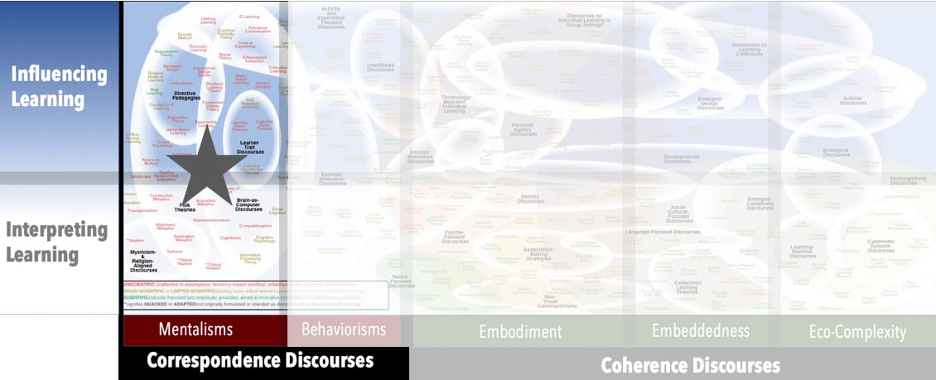Focus
Reasoned thought as the source of truthPrincipal Metaphors
- Knowledge is … demonstrable truths
- Knowing is … evidence-based awareness
- Learner is … an inquirer
- Learning is … deriving truth from evidence
- Teaching is … formatting experiences
Originated
AncientSynopsis
The phrase a posteriori is Latin for “from the later” (and it is typically contrasted with a priori, Latin for “from the earlier” – compare: a priori Discourses). The term is used both to refer to truth claims that are based on replicable evidence (e.g., via observation, experimentation, empirical demonstration) and to categorize discourses that privilege observation over argument. Associated constructs include:- a posteriori Comparison/Contrast (Post Hoc Comparison/Contrast; Unplanned Comparison/Contrast) – any attempt to look for specific relationships or patterns in data that were collected for a different purpose
- Actualism – the rejection of any sort of existence beyond what is actually present – that is, the assertion that everything that can exist/be already exists/is (compare: Possibilism, under a priori Discourses)
- Middle-Range Theory – an umbrella category that includes any perspective aimed at integrating theoretical and empirical research – that is, a priori Discourses and a posteriori Discourses – on a specific phenomenon or within a specific domain of inquiry
Commentary
The phrase a posteriori is certainly useful for purposes of description and categorization of those discourses that assume separations of reasoned conclusion and observed evidence. As we aim to illustrate through this site, however, issues arise when it is coupled with a priori to generate a continuum that is imagined to span all claims to truth and all discourses on knowledge and learning.Subdiscourses:
- a posteriori Comparison/Contrast (Post Hoc Comparison/Contrast; Unplanned Comparison/Contrast)
- Actualism
- Middle-Range Theory
Map Location

Please cite this article as:
Davis, B., & Francis, K. (2025). “a posteriori Discourses” in Discourses on Learning in Education. https://learningdiscourses.com.
⇦ Back to Map
⇦ Back to List
